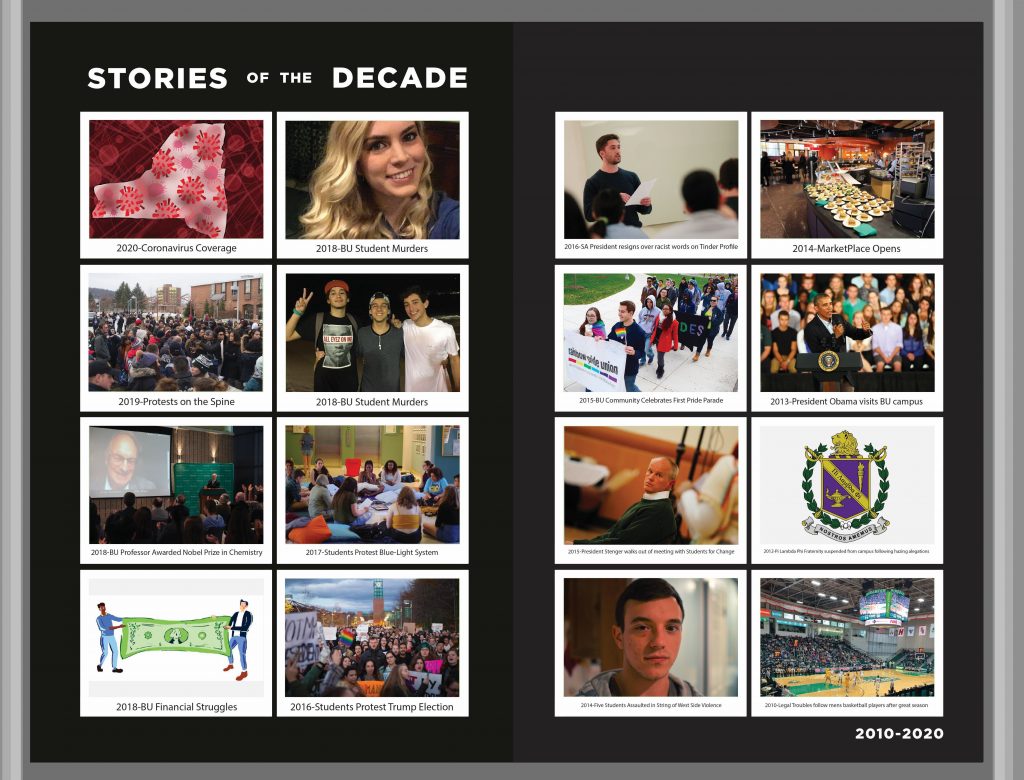Binghamton University is an ever-evolving community with a rich history. To get you up to speed on what’s been happening here, Pipe Dream has compiled our biggest stories of the past decade. You’ll see everything from local tragedy to global triumph. You’ll see how things once were and how they got to be what they are now. What we cover tells the stories of all those that call this university home, and now that includes you. How will Pipe Dream record your time at BU?
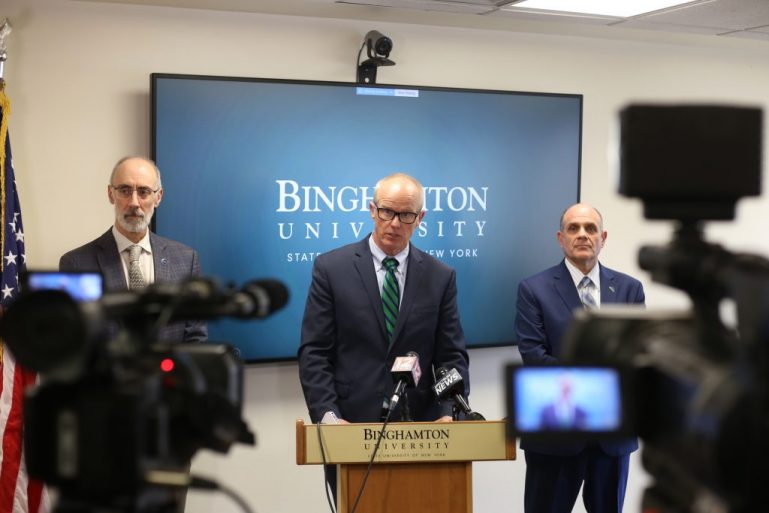
Stories on the coronavirus pandemic have been highlighted since the start of the semester. Reports of negative test results in New York State and Broome County were covered in our briefs section of the paper. On Feb. 3, the first story about the virus’ impact on the University was written covering BU’s announcement of stopping University-funded travel to China. More briefs were written about COVID-19 on the national and state level, but by early March it became apparent that the virus was going to reach BU. A March 9 article covered the University’s plan for academic continuity. During a March 11 press conference, BU President Harvey Stenger announced the University’s plan to move to online classes by March 19. On March 16, we printed our last print issue of the semester with almost all stories covering some aspect of the pandemic, including racism toward Asian students and tips for slowing the spread of the virus. Pipe Dream has continued our coverage of the pandemic online with an entire page on our website dedicated to our COVID-19 stories.
Students protest conservative student groups
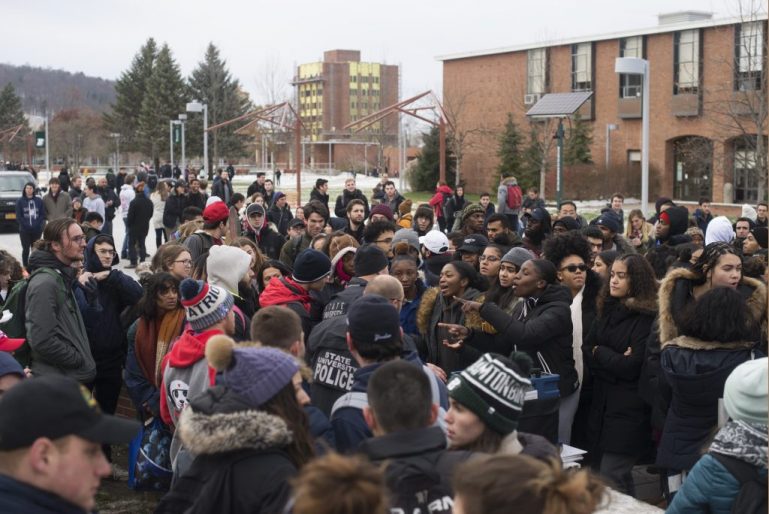
A series of student protests occurred toward the end of the fall semester in 2019. The first protest broke out on Nov. 17 against BU’s Turning Point USA (TPUSA) and College Republicans. They were tabling on the Spine in support of gun rights and to promote a Young America’s Foundation (YAF) event where economist Arthur Laffer, an economist during the Reagan administration, would be speaking. A crowd of protesters gathered to denounce the tablers as a school shooting had happened just hours earlier at a high school in Santa Clarita, California.
Officers from Binghamton’s New York State University Police Department (UPD) de-escalated the situation, but the protesters criticized the action as protective of the conservative student groups. The next protest took place a day later on Nov. 18 at the YAF event featuring Laffer. Protesters staged a sit-in and read-aloud stories of police brutality. UPD arrested two of the protesters. These events garnered attention outside of the BU community from State Sen. Fred Akshar, State Assemblyman Douglas Smith and President Donald Trump. Trump criticized the events at TPUSA’s fifth-annual Student Action Summit in West Palm Beach, Florida in December where he also invited Lacey Kestecher, president of BU’s TPUSA chapter and a freshman majoring in business administration, on stage to tell her side of the story.
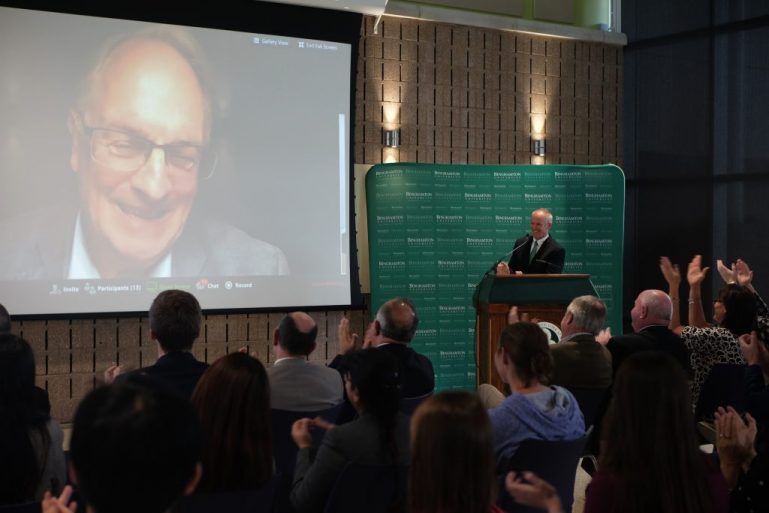
M. Stanley Whittingham, distinguished professor of chemistry and materials science and engineering, was awarded the Nobel Prize in Chemistry in October 2019, along with Akira Yoshino and John B. Goodenough. The award recognized Whittingham’s involvement in the invention of the lithium-ion battery. These rechargeable batteries are commonly used in laptops, cell phones and electric cars. Whittingham was the first and only person employed at BU to receive a Nobel Prize. A subsequent celebration was held at the University in honor of Whittingham as well as a BU Forum event for him to talk about his trip to receive the award in Sweden. In January 2020, Gov. Andrew Cuomo recognized Whittingham’s importance to creating a future built on sustainable energy by naming him head of New York State’s Blue Ribbon Task Force, which aims to expand the use of electric vehicles in the state.
University faces financial challenges
On Nov. 7, 2018, President Harvey Stenger and Donald Nieman, provost and executive vice president for academic affairs issued a memo revealing new fiscal plans in response to recent financial difficulties. The challenges arose out of the need to increase revenue to cover the new United University Professions (UUP) contract with the State University of New York (SUNY). UUP is a higher education union for faculty, professional staff, contingent employees and retirees of the SUNY system. The contract started July 2, 2016 and will last until July 1, 2022. It included a 2 percent pay increase for faculty and staff each year, which amounts to roughly $4 million per year. In order to overcome the problem at the time, the University attempted to increase enrollment but fell short of the goal, cut the library budget by 4 percent for the next year and instituted a hiring freeze. BU has since been able to increase enrollment and received a one-time grant from the state to help with the costs. On Oct. 8 2019, the hiring freeze was lifted after 335 days.
Two students murdered by students in separate cases
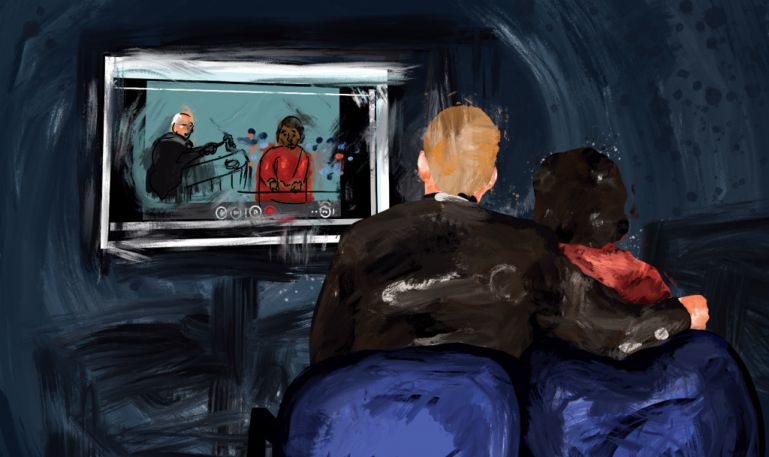
Tragedy struck BU twice in spring 2018. The first was on March 9 when 22-year-old Haley Anderson, a senior majoring in nursing from Westbury, New York, was found dead in a house on the city of Binghamton’s West Side, a neighborhood with predominately student residents. At the time, all that was known about the suspect was that he was romantically involved with Anderson. A police investigation revealed the suspect to be Orlando Tercero, a former BU nursing student, who had fled the country by flying to Nicaragua before Anderson’s body was found. Unable to extradite him to the United States, Tercero faced trial in Nicaragua, found guilty of femicide on Nov. 1, 2019 and sentenced to 30 years in prison.
The second tragedy occurred on April 15 when Joao Souza, a freshman majoring in engineering originally from Brazil, was stabbed in Windham Hall of Mountainview College. The suspect fled on foot leading to a 20-hour manhunt. Former student Michael Roque, of Massapequa, New York, was apprehended in his dorm room in Hunter Hall of Mountainview College. Roque was sentenced to 20 years to life in prison for second-degree murder in November 2019. Evidence was found showing the murder to be premeditated and in retaliation for Souza dating an ex-girlfriend of Roque’s from high school.
Students protest blue-light system
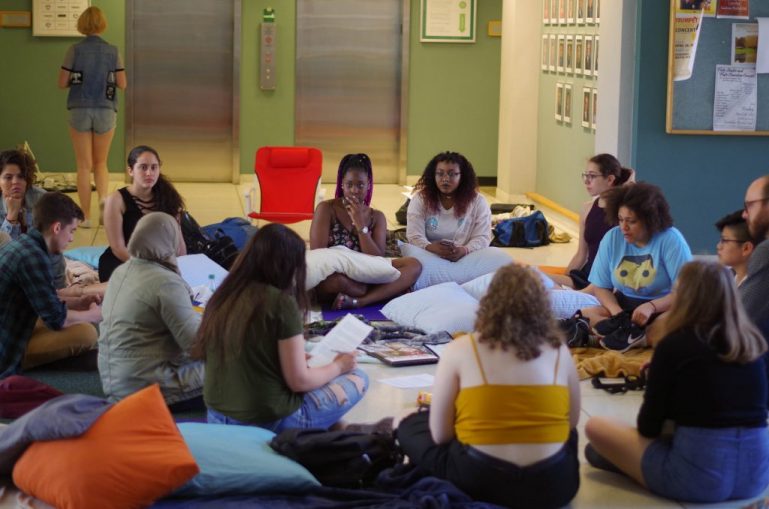
In Feb. 2017, Binghamton Mayor Rich David announced the plan to expand BU’s blue-light phone system and add security cameras to the West Side neighborhood. The idea was created by the Roosevelt Institute, a BU student group dedicated to student-crafted progressive policy, as a way for the University to give back to the community it resides in. The blue-light system would cost BU $200,000 per year for five years. By mid-April, the plan had raised concerns from community and student groups who questioned the motives and effectiveness of the plan.
The opposition groups argued that the initiative would lead to over-policing and insinuated that students need to be “protected” from Binghamton residents. While the initiative had student safety in mind, the detractors said crime rates had been dropping in Binghamton for the past 20 years. The Frances Beal Society, a coalition of students who want to see progressive change both on campus and in the greater Binghamton community, organized a march on the Couper Administration Building on April 27, 2017 to demand the University withdraw its financial support from the blue-light program and put the funding toward other programs like mental health counseling. When the administration failed to meet the protesters’ demands, the students occupied the building for over two weeks. Offices in the building were relocated in order to avoid the protest. In the end, the administration did not go through with the blue-light expansion.
The 2016 presidential election
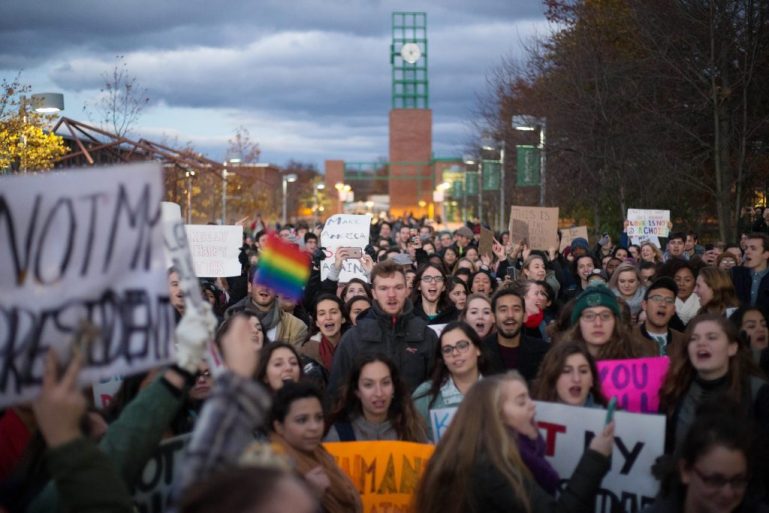
Before the election, Pipe Dream ran a story about the results of a poll which looked at who students intended to vote for. The poll was created by students in Political Science 340 and Judaic Studies 389B: Public Opinion and was sent out to undergraduates by the class instructor Jonathan Krasno, an associate professor of political science. The results showed Hillary Clinton as the favorite for BU students with 65.5 percent of respondents saying they would vote for her as opposed to 15.6 percent for Donald Trump. However, the results on the national level told a more contentious story leading to Trump’s victory with 279 electoral college points opposed to Clinton’s 218. Some members of the BU community did not expect Trump to win. At an election viewing party hosted by the Black Student Union (BSU), once the race started to get tighter around 10 p.m., tensions in the room began to rise. In reaction to the results, a protest march took place the Friday following the election. Hundreds of students and faculty marched on the Spine and listened to students give speeches at the Pegasus Statue. The event aligned with other protests going on around the nation.
SA president resigns due to racist language on Tinder
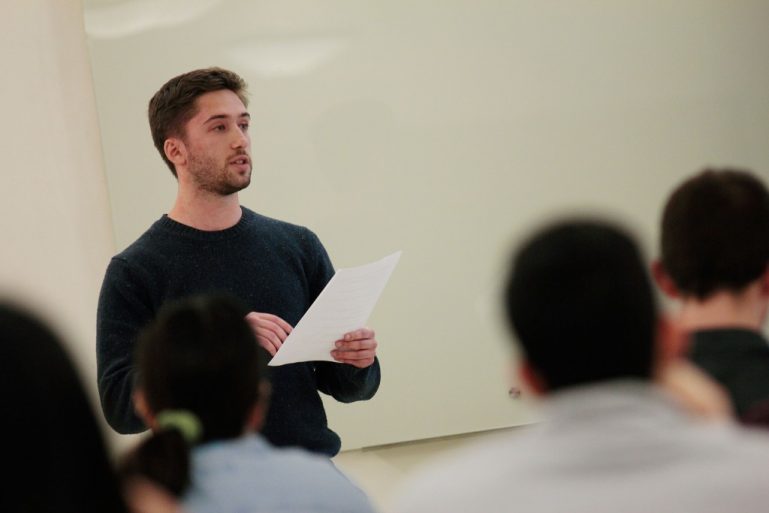
In February 2016, SA President Dillon Schade was called to resign from his position by the BSU for using racially charged language on his profile on Tinder, a dating app. The BSU wrote an open letter and had a town hall meeting in which they asked for a formal apology and resignation from Schade. The group received support from several other multicultural organizations. Pipe Dream vocalized support for Schade’s resignation through an editorial on Feb. 19, 2016. Schade denied writing the phrase on the Tinder account and claimed it was edited by an unknown perpetrator in an apology posted on his Facebook page. He also sent a formal apology to the student body via email. However, Schade ended up resigning from his position at an SA Congress meeting on Feb. 22 with the resignation going into effect on Feb. 24. Schade cited the reason for his resignation as being due to an ultimatum given to him by the BSU—“It was either I resign my position as SA president and they go quietly, or I do not resign and they threaten to use their alumni base to reach out to local, state and national media and the NAACP and force my resignation,” Schade said at the meeting.
BU celebrates first pride parade
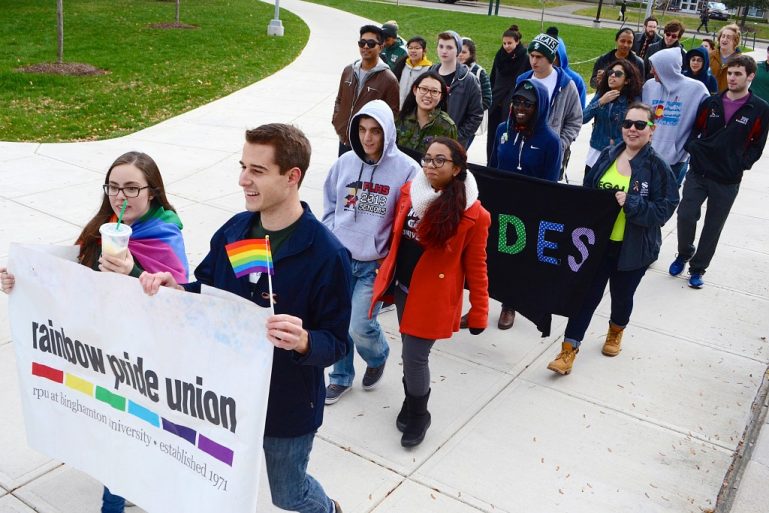
LGBTQ+ students and allies participated in BU’s first Pride Parade on Oct. 17, 2015. The event was organized by Matthew Walsh, a second-year graduate student studying student affairs administration, with the help of the Rainbow Pride Union and SHADES, two organizations which aim to promote civil rights and actions and inclusivity for the LGBTQ+ community. Walsh said that the event was an effort to created a more visible LGBTQ+ community at the University. His efforts to strengthen the community led to the creation of the Q Center, a campus resource designed “to foster a campus environment that is inclusive and supportive of all sexual orientations, gender identities and gender expressions,” according to its website. The parade still goes on annually and is now one of many events that occur during LGBTQ History Month on campus.
President Stenger walks out of meeting with Students for Change
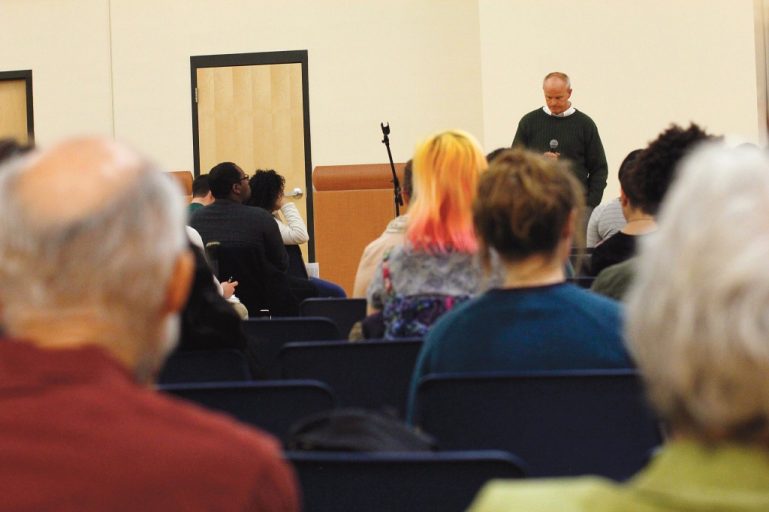
Students for Change, a campus group whose mission was to fight discrimination at BU, held an open town hall meeting on March 25, 2015, to discuss a list of 25 demands the organization presented to Provost Donald Nieman in late December. The group’s creation and actions were in response to the killings of Eric Garner and Michael Brown, two African American males shot by Caucasian police officers whose deaths ignited protests against police brutality throughout the United States, including numerous demonstrations on the BU campus during the previous fall semester. The meeting in March saw over 100 students, faculty and administrators turn out to ask Stenger questions relating to the list of demands regarding discrimination on campus, according to the group.
Specific questions were asked about banning the social media app Yik Yak, a forum where BU students could post anonymously and had resulted in racist remarks. Students asked for the institution of a “zero-tolerance policy” for racism from the administration. Other questions resided in asking how the BU administration would handle racist situations like those in other universities like the University of Oklahoma, where a fraternity there was video recorded while singing racist chants. Students also pressed on the employment of administrators in the Office of Diversity, Equity and Inclusion —now the Division of Diversity, Equity and Inclusion — who the attendees found to be hostile and condescending regarding their concerns about discrimination.
After over two hours of questioning, Stenger dropped the microphone and left abruptly after being asked if he would send a representative to meetings regarding incidents like these to report on the progress of the administration. “No,” Stenger said. “I’m going to even consider whether I want to stay here.” He departed after this response, but apologized to Students for Change for his actions after they occupied his office a few days after the meeting.
BU explores options to increase student safety following assaults Downtown
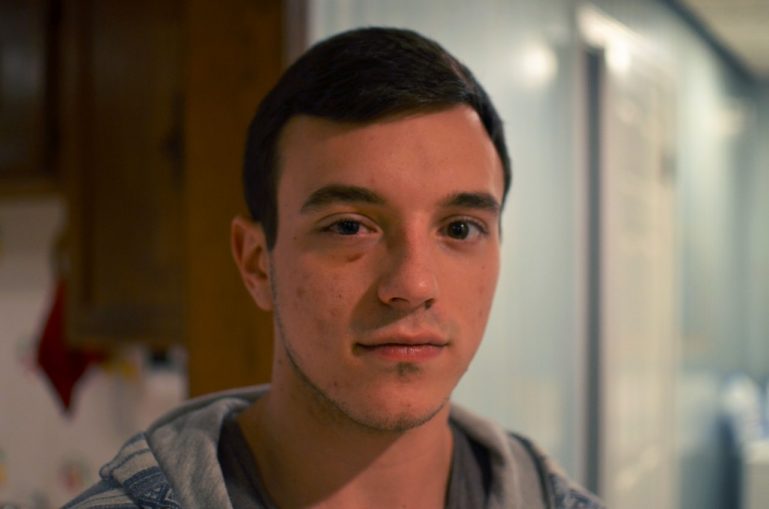
The 2014 fall semester saw three separate incidents in which five BU students were assaulted. The most recent attack landed the victims in the hospital due to their injuries. According to the Binghamton Police Department (BPD), the assaults, as well as a string of robberies on the West Side, were attributed to a group of high-school aged perpetrators. Local police, the University and the Off Campus College Council (OC3) worked to support the victims by providing case managers, contacting students’ professors and loaning money to replace stolen items. The OC3 also hosted a Housing and Safety Fair in the Mandela Room to provide students information about living in Downtown Binghamton.
BU and the Binghamton Police Department (BPD) worked together to create the Police Partnership Initiative before these incidents occurred with Officer Dan Flanders as the liaison between the two organizations. This initiative was intended to be a resource for students to share their safety concerns with. For the article, Flanders discussed a safety message emailed to all BU students which he created with the former Assistant Dean of Students for Off Campus Programs Milton Chester. “It goes over some key factors of ways that you can be safe: Be aware of your surroundings at all times, stay alert,” Flanders said. “If you feel uncomfortable in a place or situation, listen to your instincts and leave, get out or call for help.”

The Marketplace, the University’s diverse dining option, first opened its doors at the start of the spring semester in 2014. Located in the University Union, the Marketplace occupies what was formerly the Food Court and Susquehanna Room. It opened with 12 “food concepts” and it was recognized early on by Brian Rose, vice president for student affairs, that the space could change based on student input. The original 12 “food concepts” still in operation include Red Mango and Mein Bowl. In order to get direct student involvement in the dining decisions on campus, Sodexo, BU’s dining services provider, created the Student Culinary Council. This group has led to the evolution of the Marketplace to what it is now as well as changes to dining all around campus. The 18-month renovation also included the connecting of two previously separate Unions into the Union that exists today.
President Barack Obama comes to BU
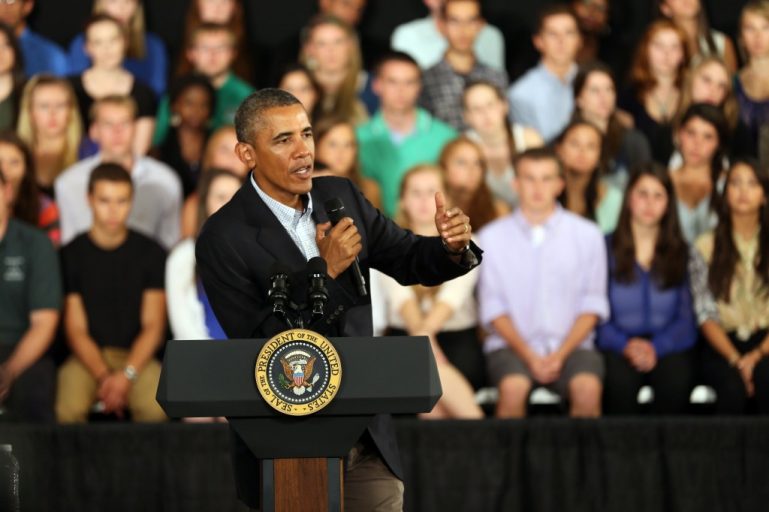
For Pipe Dream’s first issue of the fall semester in 2013, the front page was our logo and a picture of then-President Barack Obama standing at a podium, addressing BU students. Obama spoke to a crowd of around 300 students, faculty, staff and media members in the Mandela Room on Aug. 23. Audience members were selected through a lottery system and those who could not see the event in person could watch it through a livestream. The stream was also shown at the Watters Theater in the Anderson Center. The event was held in a town-hall-style that lasted just over an hour. BU was one stop on the president’s two-day bus tour of upstate New York and northern Pennsylvania to discuss his new plan to lower the cost of higher education. He began the event briefly detailing the plan then fielded questions from the audience on topics such as green energy and racism.
Trouble in Greek Life gets coverage from The New York Times
On April 11, 2012, the University suspended all pledging due to allegations of hazing. Six days later, Rose confirmed that more than 10 Greek organizations were under investigation for hazing. A few days later, a story about the investigations was in the New York Times. The article ended with a quote from a Pipe Dream editorial where it called for action to be taken in regard to the allegations. “If even half of the rumors swirling around campus are half-true, then the jig needs to end,” the editorial said. “The University no longer has plausible deniability.” A second article came out in The New York Times in September and made it onto the front page—this time with more detailed accounts of hazing at BU and a comment from then Pipe Dream editor-in-chief Daniel Weintraub.
As a result of the article, over 100 students involved in Greek Life gathered outside Glenn G. Bartle Library to denounce hazing. Our article about the rally pointed out that the Times only mentioned an unrecognized fraternity and used anonymous sources for its hazing stories. However, the coverage did push the University to look into what is really going on in Greek Life at BU, going as far as to hire a consulting firm, the Fraternity and Sorority Coalition Assessment Project, to investigate the issue and recommend ways to improve.
Legal troubles follow men’s basketball players after great season
The BU Bearcats men’s basketball made its first and only appearance in the National Collegiate Athletics Association’s (NCAA) March Madness tournament in 2009. The team lost in the first round to number two seed Duke University, but this only foreshadowed the team’s problems. Six team members were dismissed from the team in connection with crimes including possession of crack cocaine and the use of a stolen debit card. In 2010, Pipe Dream covered the developments for the trial of Emanuel “Tiki” Mayben, the athlete charged with possession and Derrick ‘D.J.’ Rivera, the one who used the stolen credit card.
The other players dismissed were with Rivera when he used the debit card, but denied knowing it was stolen. This led to the men’s basketball team pulling out of the 2010 NCAA tournament after finishing fifth in the regular season. The decision was made by then BU President Lois DeFleur, who was named in a Feb. 12 audit of the athletic program as being a co-conspirator in a scandal that overlooked alleged criminal activity and pushed for lowered academic standards. DeFleur, head coach Kevin Broadus and others involved in the scandal left the University shortly thereafter.



